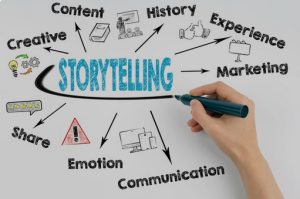The power of storytelling in business communication and marketing is a strategic tool that goes beyond conveying information; it connects with audiences on an emotional level, making messages more memorable and impactful. The purpose of this analysis is to highlight the power of storytelling in business communication and marketing:

Power of Storytelling in Business Communication and Marketing
Table of Contents
Toggle1. Engagement and Connection:
- Humanizing Brands: Stories humanize brands by creating relatable narratives. When people connect emotionally with a story, they are more likely to engage with the brand and remember its message.
2. Building Trust and Credibility:
- Authenticity: Authentic storytelling builds trust. When companies share genuine stories about their values, challenges, and successes, it fosters credibility and strengthens the relationship between the brand and its audience.
3. Memorability:
- Retention of Information: Stories are easier to remember than facts and figures alone. Narrative structures make information more memorable, helping consumers recall and share the brand’s message.
4. Influence on Consumer Behavior:
- Creating Emotional Responses: Emotional connections formed through storytelling influence consumer behavior. Compelling stories can drive purchasing decisions and create brand loyalty.
5. Differentiation and Positioning:
- Unique Brand Identity: Stories differentiate brands by creating a unique identity. A well-crafted narrative sets a brand apart from competitors and helps define its position in the market.
6. Communicating Values and Culture:
- Culture Representation: Stories are effective for conveying a company’s values and culture. They showcase what the brand stands for, allowing consumers to align themselves with those values.
7. Simplifying Complex Information:
- Clarifying Messages: Complex information can be simplified through storytelling. Narratives help break down intricate concepts, making them more accessible and understandable to a broad audience.
8. Inspiring Action:
- Call to Action: Compelling stories inspire action. Whether it’s making a purchase, sharing content, or supporting a cause, stories can motivate audiences to take specific actions.
9. Brand Loyalty:
- Emotional Loyalty: Emotional connections foster brand loyalty. When consumers feel a personal connection to a brand through its stories, they are more likely to remain loyal and advocate for the brand.
10. Adaptability Across Platforms:
- Multi-Platform Compatibility: Stories can be adapted across various platforms, including social media, video, blogs, and traditional media. This flexibility allows brands to reach diverse audiences using different mediums.
11. Overcoming Skepticism:
- Building Credibility: Stories can address skepticism by providing evidence, testimonials, or personal experiences. This helps build credibility and mitigate doubts consumers may have.
12. Brand Recall:
- Association with Narratives: Brands associated with powerful narratives are more likely to be remembered. The story becomes intertwined with the brand, reinforcing recall.
13. Cultural Relevance:
- Connecting with Culture: Stories that resonate with cultural themes and current events are more likely to capture the audience’s attention. They reflect an understanding of the cultural context in which the brand operates.
14. Creating Shareable Content:
- Viral Potential: Compelling stories have the potential to go viral. When audiences find stories meaningful or entertaining, they are more likely to share them, expanding the brand’s reach.
15. Employee Engagement:
- Internal Communication: Storytelling is not limited to external audiences. Internally, sharing stories about employees, achievements, and milestones can enhance team morale and engagement.
Conclusion:
The power of storytelling lies in its ability to resonate emotionally, capture attention, and convey messages in a memorable way. Businesses that harness the art of storytelling in their communication and marketing strategies are better positioned to connect with audiences, differentiate themselves in the market, and build lasting relationships with customers and stakeholders. Whether through brand origin stories, customer testimonials, or social impact narratives, storytelling remains a potent tool for businesses seeking to leave a lasting impression in the hearts and minds of their audiences.
